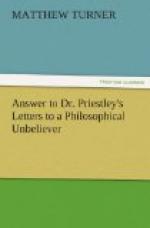The ubiquity of God is proved in this short way: “God made every thing, God controuls every thing. No power can act but where it is. Therefore God is present every where. The workman must certainly be present at his work, but when the work is done he may go about other business. If all the properties of matter, such as gravity, elasticity and other such existed only by the perpetual leave and agency of the Deity, it may be argued he is in all places where matter is. Space, empty space will still exist without him. In this mode of proof Dr. Priestley must, contrary to the Newtonian system argue for a Plenum, before he proves the ubiquity. He cannot exclude space from his mind, nor can he exclude gravity from matter. Yet can he admit matter as well as space to be eternal, because he will not allow the inactivity of God.” “If God’s works had a beginning he must have been for a whole eternity inactive.” He seems to have an odd notion of eternity, for he there allows it could have an end. The argument would be fairer in concluding “he must have been inactive or doing something else.”
The Deity set up, if not the creator of matter, is at least the matter of it, nor will his advocates by any means allow him to be material himself. They see some incongruity in admitting one piece of matter to be so complete a master of another. However Dr. Priestley and other arguers for a Deity would do well to consider, that whatever is not matter, is a space that matter may occupy. Therefore if God is not matter, and also is not space, he is nothing. Dr. Priestley allows matter eternal, and its properties of gravity, elasticity, electricity and others equally eternal. He says directly, that matter cannot exist without it’s perpetually corresponding powers. The adjustment of those powers he places in the Deity. But as we never see matter without the adjustment of those properties as well as the existence of them, this drives him at last to say, the Deity must also have created matter, according to his system eternally created it, cotemporarily with himself. Ideas absurd and irreconcileable!
Discoursing upon the hypothesis of “a fortuitous concourse of atoms” Dr. Priestley asks, “what reason we have to think that small masses of matter can have power without communication ab extra?” Let this question be returned, “have we not reason to think so from attraction the most common property in matter.” To get rid of this difficulty he will not allow an atom of matter to be possessed originally of the most simple powers, though he is ready to allow matter to have been eternal. A magnet according to this system must sometime have existed without its magnetic power. He concludes there must be some original existent Being. He shall be allowed many original existent Beings if it pleases him. A man may be an originally existent being, as well as any other. He is superior to other animals in this world. In like manner there may be allowed superior Beings to man (as most probably there are) and yet those superior Beings not have made man.




